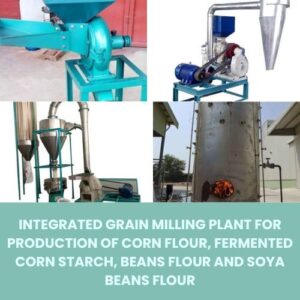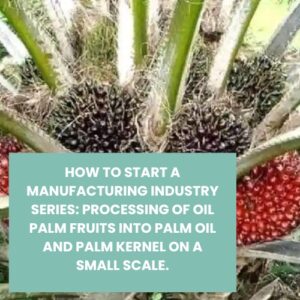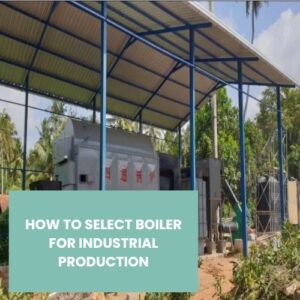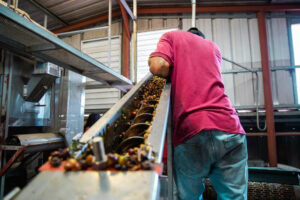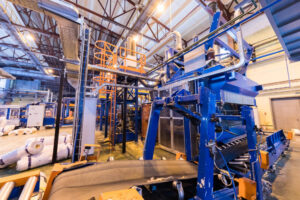HOW TO START MANUFACTURING INDUSTRIES
(A Publication of N.C. Gilbert Dev. Co. Ltd)
Processing And Packaging of Poundo Yam And Plantain Flour
Pounded yam meal is popularly consumed by almost every Nigerian tribe. It is prepared traditionally by cooking fresh yam tubers and pounding into a meal with mortar and pestle. Over the years, population growth and education has resulted in rural urban drift and migration overseas of people in search of organized employment opportunity. This has fuelled the need for processing and packaging of Nigerian local foods for easy delivery to places far and near where they are needed.
Instant pounded yam flour production involves Industrial conversion of fresh yam tubers into packaged flours that can be easily reconstituted into a pounded yam meal without the need for pounding with pestle and mortar. This has brought succor to Nigerians resident in cities around the world who relish the pounded yam meal.
Similarly, plantain flour is industrially produced from fresh plantain and it is easily reconstituted into plantain meal by the consumer. While the plantain flour is in high demand because of its health benefits, it also serves to preserve and make the plantain meal available during off season.
This profile aims at providing start-up information for a would-be Investor who intends to venture into Processing and Packaging Yam and Plantain into flour for both local and export markets. The plant is planned to process two ton of either Plantain or yam in 20 hours a day into packaged flour.
Market
Experience of Processors in this industry has revealed that there is a potential high demand for Poundo yam and Plantain Flour in both domestic and Export markets for good reasons. First, the geometrically exploding population and the continued rural urban migration means a huge market locally for Poundo Yam flour.
However, the high cost of processed Poundo yam Flour has tended to limit the market locally to the middle and upper class citizens because of the weak domestic economy. On the other hand, the export market has welcomed the flour with open hands to the extent that information from the Nigerian Exports Promotion Council has shown the wide gap between demand and supply caused by increased migration of Nigerians to other countries in search of greener pastures. The bottom line is that a huge market exists in Europe, America and most other countries with sizeable black immigrants.
Currently, Experts have estimated the potential demand for Pounded Yam Flour to be in excess of 50,000 tons per annum, out of which, only about 25% is being met by operators in the industry.
For Plantain Flour, the market prospect is even more promising. According to a recent business day newspaper report quoting Bill and Melluda gates Foundation research findings. Nigerians current plantain flour production is about 25,000 metric tons (MT) per annum while the demand is projected at 125,000 (MT) metric tons per annum. This leaves a demand gap of about 100,000 metric tons (MT) per annum.
Raw Materials:
Yam (Dioscorea SPP) is a tropical perennial crop cultivated mainly for its edible tubers. West African accounts for 90 – 95% of world yam production with Nigeria as the largest single producer.
The main specie of yam that is suitable for processing into Poundo Yam flour is the white yam variety, (Dioscorea Rotundata). It is produced abundantly in Nigeria.
Plantain thrives in the South-South and South West geographical zones of Nigeria. Currently, the two zones account for 60% of the total plantain production. Plantain is an all year crop when supported by adequate rain fall but its main season is August through December with an estimated annual production of 2.4 million metric tons. Nigeria is one of the largest producer of plantain in West Africa.
Processing:
The first in the series of stepwise activities for production of flour from Yam and Plantain is selection, purchase and transportation of raw materials to the factory.
It is recommended to use the right specie of either bunches or tubers of the raw material that is free from damage or bruises. The aim is to have a high quality end product. Once in the factory, the raw material is washed before processing.
- Washing:
The raw material (Yam/Plantain) to be processed is first washed in a Vat manually or by use of a paddle washing machine. The objective is to remove sand and other contaminants that commonly adhere to raw materials delivered for processing.
- Peeling and Slicing:
The washed tubers are next transferred to stainless topped preparation tables where the outer coverings are manually peeled with knives. The peeled raw materials are cut into cubes and immersed in water bowls to avoid browning reaction.
- Parboiling:
The yam/Plantain slices are next transferred to a blanching equipment where the raw materials are exposed to steam for a few minutes. The purpose is to inactivate degenerative enzymes and harmful micro-organisms.
- Drying:
Blanched yam slices are dried (dehydrated) at specified drying temperature in a specially designed equipment – usually, a shelf dryer with perforated trays. Drying may last for up to 4 hours at a stretch. After drying, the chips are stored in air tight containers.
- Grinding:
The dried yam/plantain chips are subsequently milled and sieved into uniform sized fine flour by the use of a grinding machine equipped with sizing mesh.
- Packaging:
The ground and sieved yam/plantain flour is automatically weighed and filled into prepared cellophane punches and the package sealed in a continuous heat sealing machine.
Requirements for setting up a Processing Plant of 2000kg of either Yam or Plantain into flour in 20 hours a day is presented below:
- Equipment and Machinery Requirements:
The equipment used in the plant is of a standard type. However, it is specialized for each installation. For this reason, a single price covers the complete equipment necessary to set up the production facility. The purchase of all production equipments from one dependable source ensures a well engineered plant with balanced productive capacity of the individual units.
The holding bins and steam boiler are included in the production equipment since they are directly connected to the production line.
Production Tools and Equipments are listed below:
Department Tools & Equipment Installed Cost
Production Weighting scale
Stainless steel working tables
Peeling Knives
Stirring machine
Stainless holding line
Blanching machine
Cabinet drying machine
Complete with trays
Bin drying machine
Grinding machine
Weigh filling machine
Punch sealing machine
Steam boiler
Total N25,000,000.00
- Space Requirement:
One acre of land is required for this project. This will provide ample space for expansion.
- Factory Building/Structures:
- Main Production Factory: 30ft x 30ft x 20ft (L x W x H).
- Raw Materials Store: 20ft x 16ft x 20ft (L x W x H).
- Utility Requirement:
- The total power requirement of the plant is 25KVA.
- Borehole with treatment plant and water distribution facility is required for processing and sanitary purposes.
- Manpower Requirement:
Description Number Needed
Manager 1
Foreman 2
Maintenance 3
Accountant 1
Secretary 1
Receiving and Shipping Clerks 4
Truck Drivers 2
Operators 6
Material handlers 6 .
Total 32
===
- Profitability:
Expected Profit before Tax = 26 – 30% Gross Sales
For further information, Enquiry or Consultancy, please contact N.C. Gilbert Development Company Limited. We are a firm of Industrial Process Engineers.
We can provide the following project services:
- Prepare a detailed Business Plan for the project at minimal cost.
- Set up this plant on turnkey basis for a client i.e. Design, Procure and commission the plant for production of Poundo yam/Plantain Flours.
- Supervise the training operators and staff for this industry.
- Carry out after sales maintenance of equipment.
Contact: +234-0803 4047 378 – Whatsapp.


